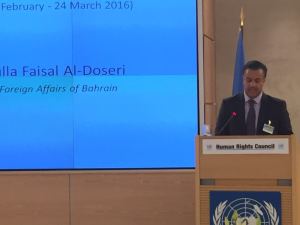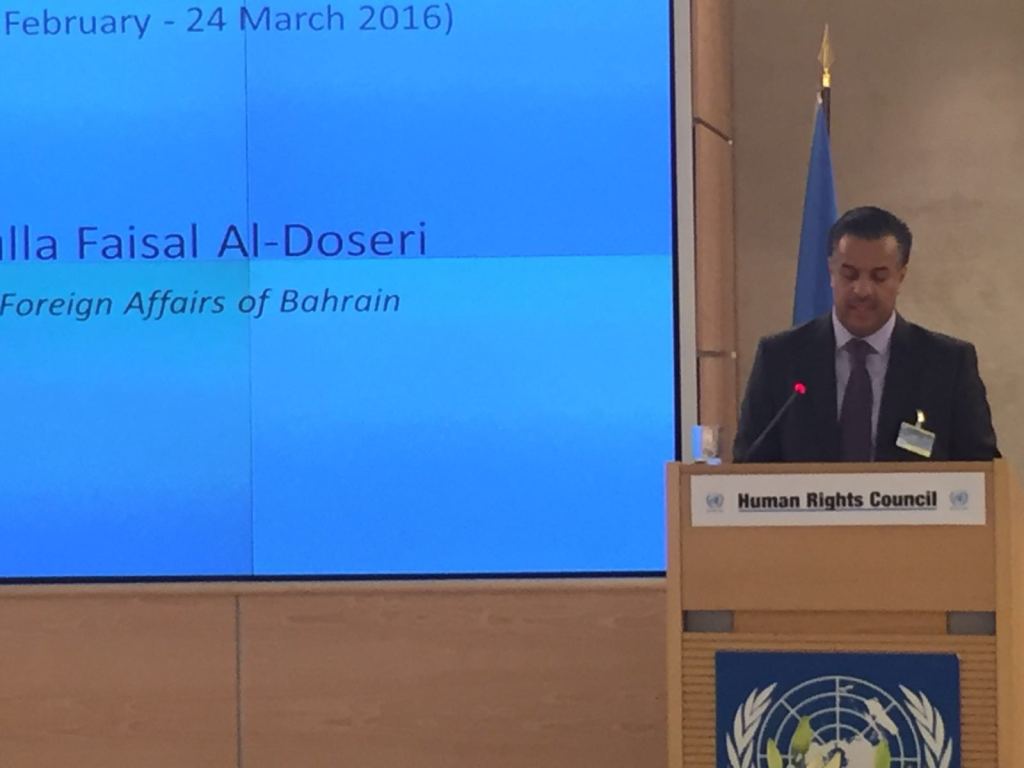
2 March 2016 – Geneva, Switzerland – Americans for Democracy & Human Rights in Bahrain (ADHRB), the Bahrain Center for Human Rights (BCHR), the Bahrain Institute for Rights and Democracy (BIRD), the European Center for Democracy and Human Rights (ECDHR), and Justice Human Rights Organization (JHRO) would like to take this opportunity to respond to the statement made today by Bahrain’s Assistant Foreign Minister Abdulla Faisal al-Dosary. While the government chose to highlight efforts to counter terrorism, we in the Bahraini human rights community wish to underscore the wide range of human rights abuses that the government continue to perpetuate and obfuscate.
Instead of addressing systematic and widespread abuses, the Assistant Minister touted the Bahraini government’s keenness toward “applying procedures for addressing terrorism and extremism… through disseminating tolerance, rejecting the rhetoric of hatred in a legal and institutional framework,” as well as “…supporting ‘responsible’ freedom of opinion and expression.”
In reality, Bahrain’s efforts to criminalize peaceful dissent has led to the human rights situation drastically deteriorating over the past year. Throughout 2015, the government abused broad counterterrorism legislation to arrested human rights defenders, journalists, and activists and subjected them to trials that violated international fair trial and due process standards. For example, authorities arbitrarily arrested the journalists Mahmoud al-Jazeeri and Sayed Ahmed al-Mosawi on unfounded terrorism charges. It also arrested human rights activist Sheikh Maytham al-Salman and imprisoned political activist Ebrahim Sharif in relation to their peaceful free expression. Arbitrary detention and torture remained widespread and systematic. Furthermore, the Government of Bahrain continued to use the revocation of citizenship as a tool to punish dissidents. In 2015 alone, the government stripped 208 people of their citizenship. It revoked journalist Sayed Ahmed al-Mosawi’s and Shia cleric Sheikh Mohammed Khojasta’s citizenships in November 2015, and expelled Sheikh Khojasta from the country in February 2016.
Mr. Dosary’s praise for Bahrain’s institutions—such as the Ombudsman, the National Institute for Human Rights, and the Special Investigation Unit—further attempts to highlight deeply flawed institutions. These institutions continue to lack essential independence from the government and the Public Prosecution, and are therefore unable to credibly or effectively prosecute human rights abuses. The Ombudsman himself is a former prosecutor whose office was implicated in past torture allegations.
“Without legitimate efforts to reform Bahrain’s national human rights institutions, a culture of impunity for human rights abuses will continue to exist,” said Husain Abdulla, Executive Director of Americans for Democracy and Human Rights in Bahrain. “Bahrainis will continue to suffer.”
Mr. Dosary’s remarks resurrected Bahrain’s annual intention to “bolster partnerships with the United Nations.” Yet, since 2011, the Government of Bahrain has cancelled multiple visits by the UN Special Rapporteur on Torture, most recently in 2013. No new date for a visit is scheduled. UN bodies continue to communicate with Bahrain regarding a wide range of human rights abuses. In the latest communication report released by special procedures at the 31st session of the Human Rights Council, procedures including the rapporteurs on freedom of expression, human rights defenders, cultural rights, freedom of religion, summary executions and torture, among others, cited Bahraini violations in six different cases. In September 2015, 33 states expressed concern over continued violations in a joint-statement at the Human Rights Council.
We continue to be gravely concerned about ongoing human rights abuses in Bahrain, including arrests of activists, widespread and systematic torture and arbitrary detention, the use of citizenship revocation as a tool to punish activists, and the lack of impartiality in Bahrain’s national human rights institutions. We call on Bahrain to swiftly implement substantive and transparent reforms that will address these issues, as well as to provide full and open cooperation with the UN’s Office of the High Commissioner for Human Rights and the Special Procedures.




